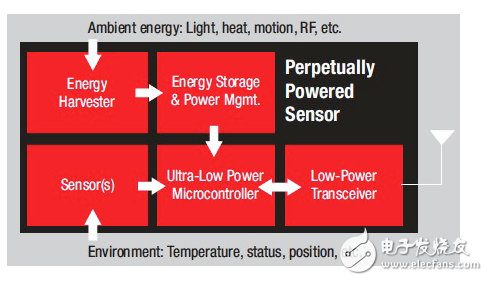
资料下载

超低功耗能量采集电路中的可靠性电路
超低功耗能量采集电路中的可靠性电路
通过利用越来越高效的能量收集传感器和超低功率集成电路,工程师可以建造更复杂的设计,由环境能源驱动。然而,由于这些设计结合了更复杂的应用电路,工程师们面临着确保在不确定环境能源下运行的设备的可靠性和延长使用寿命的挑战。为了确保他们在需要的功率限制电路工程师可以利用半导体从模拟设备,Cymbet,线性技术,集成,芯片技术,半导体制造商在ICS的可用电力主管能力操作,德克萨斯文书,其中。
在一个典型的能量采集设计的核心,电源管理电路提供1个关键功能)最大化从环境能源提取,2)充电储能装置和3)监控系统的正常运行作为一个整体的力量尽管在电压和功率的变化(图1)。在能量收集电路运行接近可用的环境功率的范围内,电源监控也是确保安全可靠运行的关键。当电压和电流超出操作规范、系统的运作,和寿命可能会导致MCUs和锂离子蓄电池损坏程序状态的损失,例如。

Figure 1: In a typical energy harvesting design such as a wireless sensor, power management circuitry plays a critical role in maximizing energy conversion and power efficiency while ensuring system reliability (Courtesy of Texas Instruments)。
Basic power monitoring circuitry is typically built into complex devices such as MCUs, which typically include a brownout reset (BOR) capability to ensure that the device will not try to run at a voltage that is too low for correct operation. Similarly, built-in power-on reset (POR) ensures that the MCU powers up with proper initialization.
For example, the TI MSP430xG461x can operate within a relatively wide range of supply voltage in normal operating mode and flash programming mode, and includes an on-chip supply voltage supervisor (SVS) circuit. The MCU‘s SVS circuit detects if the supply voltage drops below a user selectable level. The designer can select if low supply voltage levels cause the device to automatically reset or simply serve to monitor the low levels.
声明:本文内容及配图由入驻作者撰写或者入驻合作网站授权转载。文章观点仅代表作者本人,不代表电子发烧友网立场。文章及其配图仅供工程师学习之用,如有内容侵权或者其他违规问题,请联系本站处理。 举报投诉
- 相关下载
- 相关文章




